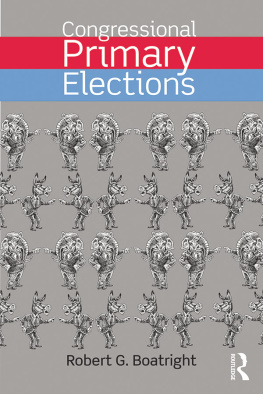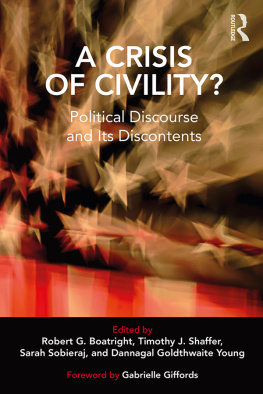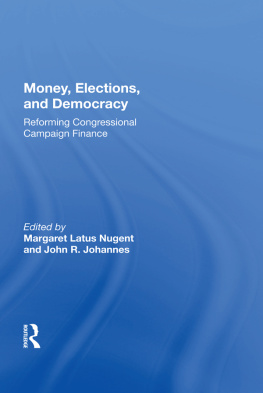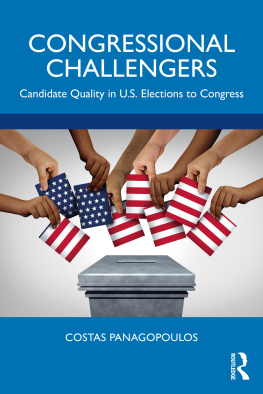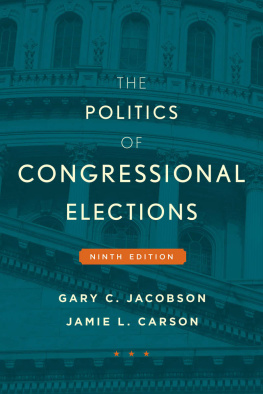CONGRESSIONAL PRIMARY ELECTIONS
Congressional primaries are increasingly being blamed for polarization and gridlock in Congress. Most American states adopted congressional primaries during the first decades of the 20th century as a means of breaking the hold of political bosses on the nomination of candidates. Yet now, many contend that primaries have become a means by which the most dedicated party activists choose candidates unrepresentative of the electorate, and so general election voters are forced to choose between two ideologically extreme candidates. Consequently, there have been recent instances in both parties where nominees were chosen who were clearly not preferred by party leaders, and who arguably lost elections that their parties should have won.
This book is the first to focus solely upon congressional primary elections, and to do so for a student readership. Boatright organizes his text around the contention that there are important differences between types of primaries, and these differences prevent us from making blanket statements about primary competition. He focuses on explanations of two sources of difference: differences in electoral structure and differences brought about by the presence or absence of an incumbent seeking reelection. The first three chapters introduce these differences, explore how they came to exist, and outline some of the strategic considerations for candidates, parties, interest groups, and voters in primary elections. The subsequent four chapters explore different types of primary elections, and the final chapter evaluates actual and proposed primary reforms.
Congressional Primary Elections is the first book to provide a history and analysis of congressional primary elections and will serve as a crucial part of courses on political parties and campaigns and elections. The book gives students the tools for understanding arguments for and against the reform of primary elections and for understanding the differences between types of primaries.
Robert G. Boatright is an Associate Professor of Political Science at Clark University. He is the author of three other books, including Getting Primaried: The Changing Politics of Congressional Primary Challenges and Interest Groups and Campaign Finance Reform in the United States and Canada. His research interests include campaign finance, congressional elections, and interest groups.
First published 2014
by Routledge
711 Third Avenue, New York, NY 10017
and by Routledge
2 Park Square, Milton Park, Abingdon, Oxon OX14 4RN
Routledge is an imprint of the Taylor & Francis Group, an informa business
2014 Taylor & Francis
The right of Robert G. Boatright to be identified as author of this work has been asserted by him/her in accordance with sections 77 and 78 of the Copyright, Designs and Patents Act 1988.
All rights reserved. No part of this book may be reprinted or reproduced or utilized in any form or by any electronic, mechanical, or other means, now known or hereafter invented, including photocopying and recording, or in any information storage or retrieval system, without permission in writing from the publishers.
Trademark notice: Product or corporate names may be trademarks or registered trademarks, and are used only for identification and explanation without intent to infringe.
Library of Congress Cataloging-in-Publication Data
Boatright, Robert G.
Congressional primary elections / by Robert G. Boatright.
pages cm
1.PrimariesUnited States.2.United States. CongressElections.3.Representative government and representationUnited States.I.Title.
JK2071.B63 2014
324.273'154dc23
2013049213
ISBN: 978-0-415-74199-6 (hbk)
ISBN: 978-0-415-74200-9 (pbk)
ISBN: 978-1-315-81494-0 (ebk)
Typeset in Bembo
by Apex CoVantage, LLC
CONTENTS
Almost a decade ago, I was invited to a conference on the subject of political polarizationa common theme, Im sure, for exclusive gatherings of academics. In preparing my remarks for this conference, I was struck by the fact that primary elections are often blamed for the ideological divisions we see in Congress today. Where, I wondered, is the evidence that primaries do in fact lead to the election of ideologically extreme candidates? And if there is such evidence, why is it that primaries were with us for nearly a century before our parties became so polarized?
As I was beginning to explore the subject, I was surprised to see that there had not been a comprehensive text on primary elections written since 1928. This may beas some of my friends have been quick (perhaps too quick) to point outbecause they arent an interesting enough subject to merit a full book. Yet it is no exaggeration to say that the nations best political scientists were extremely preoccupied with primaries for much of the 1900s, 1910s, and 1920s. The idea of primaries, it seems, used to matter a lot. This book is based on the contention that congressional primaries still do matter. Claims are frequently made about primaries, but in fact we know little about them. I will let readers determine whether they are interesting enough to deserve a book. I can say at a minimum that enough of my colleagues were interested when I described the project to them to provide assistance and encouragement.
As this project developed, I received input and guidance from several colleagues. In particular, Jeff Berry, Michael Crespin, Vin Moscardelli, and Seth Masket provided feedback or helped with difficult points in the project. Mark Miller provided valuable advice on the task of writing the book, as well as cheerfully loaning me his books on Congress. Hans Hassell, Thad Kousser, Eric McGhee, and Andrew Sinclair graciously provided me copies of their unpublished work on primaries. Gary Jacobson provided his challenger quality data, which served as a starting point for putting together the datasets used here. The campaign finance datasets here also built upon data collected at the Campaign Finance Institute; I thank Michael Malbin and Brendan Glavin for their help in understanding and using these data. At Clark University, Marc Kadushin and Amanda Gregoire provided dependable research assistance in constructing the open seat and challenger datasets. Thank you as well to Nick Giner for help with the Ohio map in .
I thank Michael Kerns, Darcy Bullock, and the rest of the editorial staff at Routledge for their support of this project. The anonymous reviews provided by Routledge also were extremely valuable in helping me shape and present my ideas here. I would be remiss, as well, not to note the debt this book owes to my earlier book on primaries, Getting Primaried: The Changing Politics of Congressional Primary Challenges. The University of Michigan Press, and political science editor Melody Herr in particular, provided valuable support in my first foray into writing about primaries. That book is written for a somewhat different audience and is focused more on a particular type of primary challenge, but my experience in writing it certainly shaped my views on the content here.
Some of the research for was supported by a Congressional Research Award from the Dirksen Congressional Center. I greatly appreciate the centers financial assistance for this project. I also gratefully acknowledge the travel and research support for this project provided by the Francis Harrington Fund at Clark University, and the Faculty Development Grant I received from Clark University in 2011.

